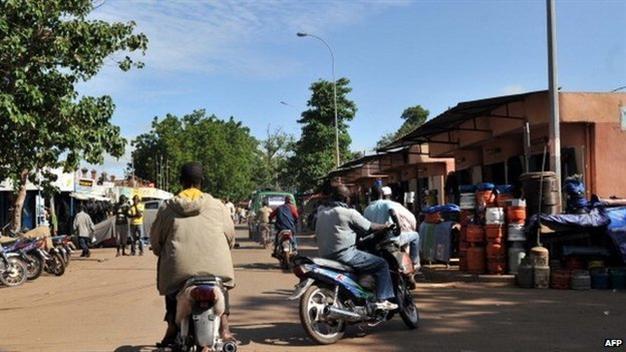Three Europeans shot dead in Mali nightclub
Bamako - Agence France-Presse

Three Europeans were shot dead at a nightclub in Mali’s capital early March 7 in a suspected terror attack that came with the government at a key stage of peace talks with militants in the restive north.
At least one gunman entered the club in an area of Bamako popular with expatriates shortly after midnight and opened fire, according to police.
"This is a terrorist attack, although we’re waiting for clarification. Provisionally, there are four dead -- one French national, a Belgian and two Malians," a policeman told AFP, adding that the dead included a police officer who had been passing by the restaurant.
A third European, whose nationality was not immediately clear, died on arrival at the Gabriel Toure hospital in Bamako, a source there said, adding that eight people were wounded.
Firefighters carried the body of the French national from La Terrasse, a restaurant and nightclub in Bamako’s lively Hippodrome district, according to an AFP correspondent who witnessed the aftermath.
In the moments after the attack, the body of the police officer and a guard of a private home could be seen in the street outside, while a little further on the body of the Belgian national was also visible.
Dozens of police officers secured the area but the few witnesses to the attack initially refused to testify, fearing reprisals.
A police source said two suspects had been arrested and were being interrogated, without revealing their identities or nationalities.
Hollande denounces 'cowardly attack' French President Francois Hollande denounced "with the greatest force the cowardly attack", according to a statement from the presidency.
It said Hollande would meet Malian President Ibrahim Boubacar Keita to offer Paris’s help to the former French colony, adding that security had been beefed up at the French embassy and other French installations in the country.
"My thoughts are with the victims and their families," said Didier Reynders, the foreign minister of Belgium, which has confirmed one of its nationals was among the dead.
EU foreign affairs head Federica Mogherini said one of the victims worked with the European Union in Mali, where the 28-nation bloc runs a mission to assist police and national guard forces.
The French embassy in Bamako issued a message to all French nationals in the city to exercise caution if they ventured out of their homes.
Mali’s vast desert north is riven by ethnic rivalries and an Islamist insurgency, and has struggled for stability and peace since a coup in 2012.
Jihadists linked to Al-Qaeda controlled an area of desert the size of Texas for more than nine months until a French-led military intervention in 2013 that partly drove them from the region.
Dozens of French citizens taken captiveThe west African nation is also struggling with a militant Tuareg movement that has launched four uprisings since 1962 to fight the army over the territory they claim as their homeland and call Azawad.
But day-to-day life in the capital has been largely unaffected by the northern conflict, and bloodshed blamed on terrorism is rare in the city of 1.8 million.
More than a dozen French citizens have been taken captive in Africa in recent years, but deaths of Westerners at the hands of jihadists in Mali remain an uncommon, if chilling, reminder of the country’s instability.
Michel Germaneau, a retired French engineer, 78, was abducted in northern Niger and murdered in Mali by Al-Qaeda in the Islamic Maghreb (AQIM) in 2010 after a failed Franco-Mauritanian raid to liberate him.
Philippe Verdon was kidnapped in 2011 from his hotel in Hombori in northeastern Mali, and two years later AQIM said it had killed him in response to France’s military intervention.
AQIM also claimed responsibility for the 2013 murders of two French journalists shot dead in Mali’s desert town of Kidal -- Ghislaine Dupont and Claude Verlon.
The March 7 attack came less than 24 hours after UN Secretary General Ban Ki-moon urged Mali’s Tuareg rebel groups to sign a peace deal agreed nearly a week ago in Algeria.
The Malian government signed the agreement last weekend, along with some northern armed groups, but the main Tuareg rebel alliance, known as the Coordination, asked for more time.
 Three Europeans were shot dead at a nightclub in Mali’s capital early March 7 in a suspected terror attack that came with the government at a key stage of peace talks with militants in the restive north.
Three Europeans were shot dead at a nightclub in Mali’s capital early March 7 in a suspected terror attack that came with the government at a key stage of peace talks with militants in the restive north.